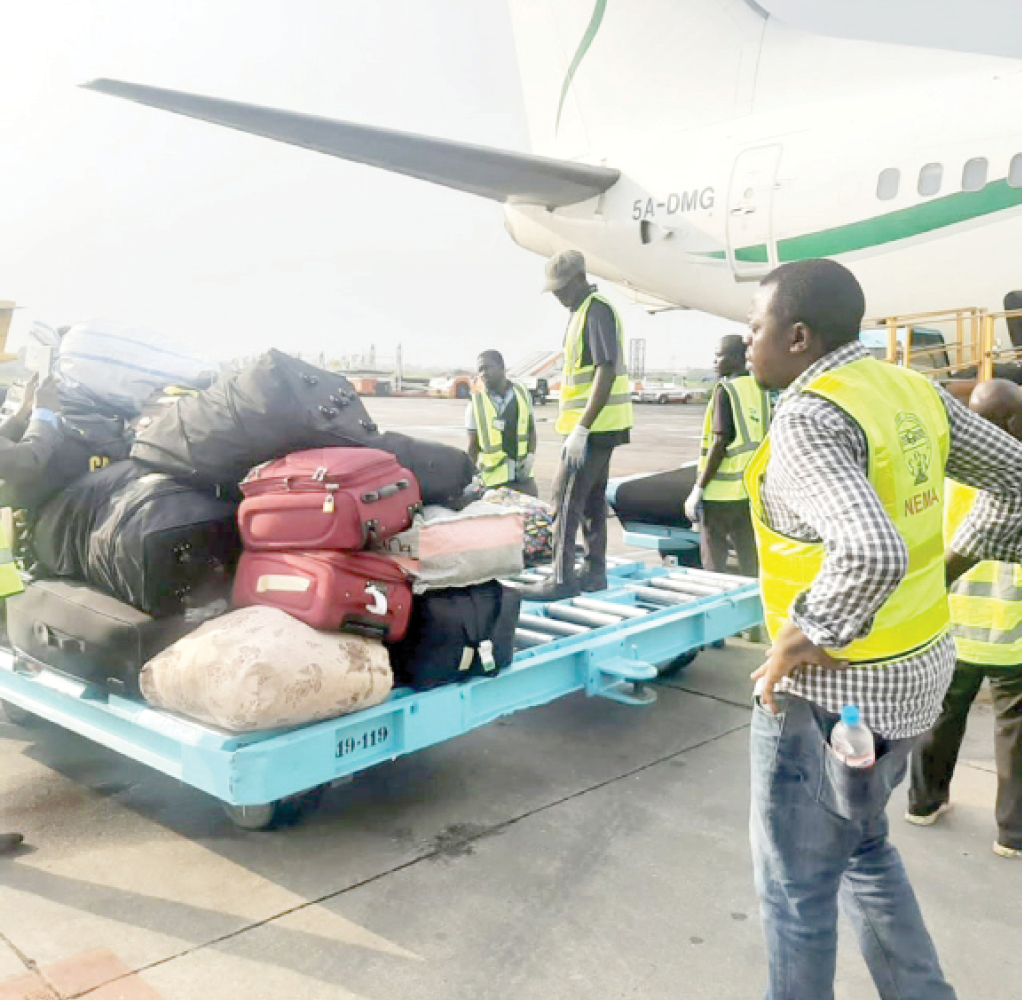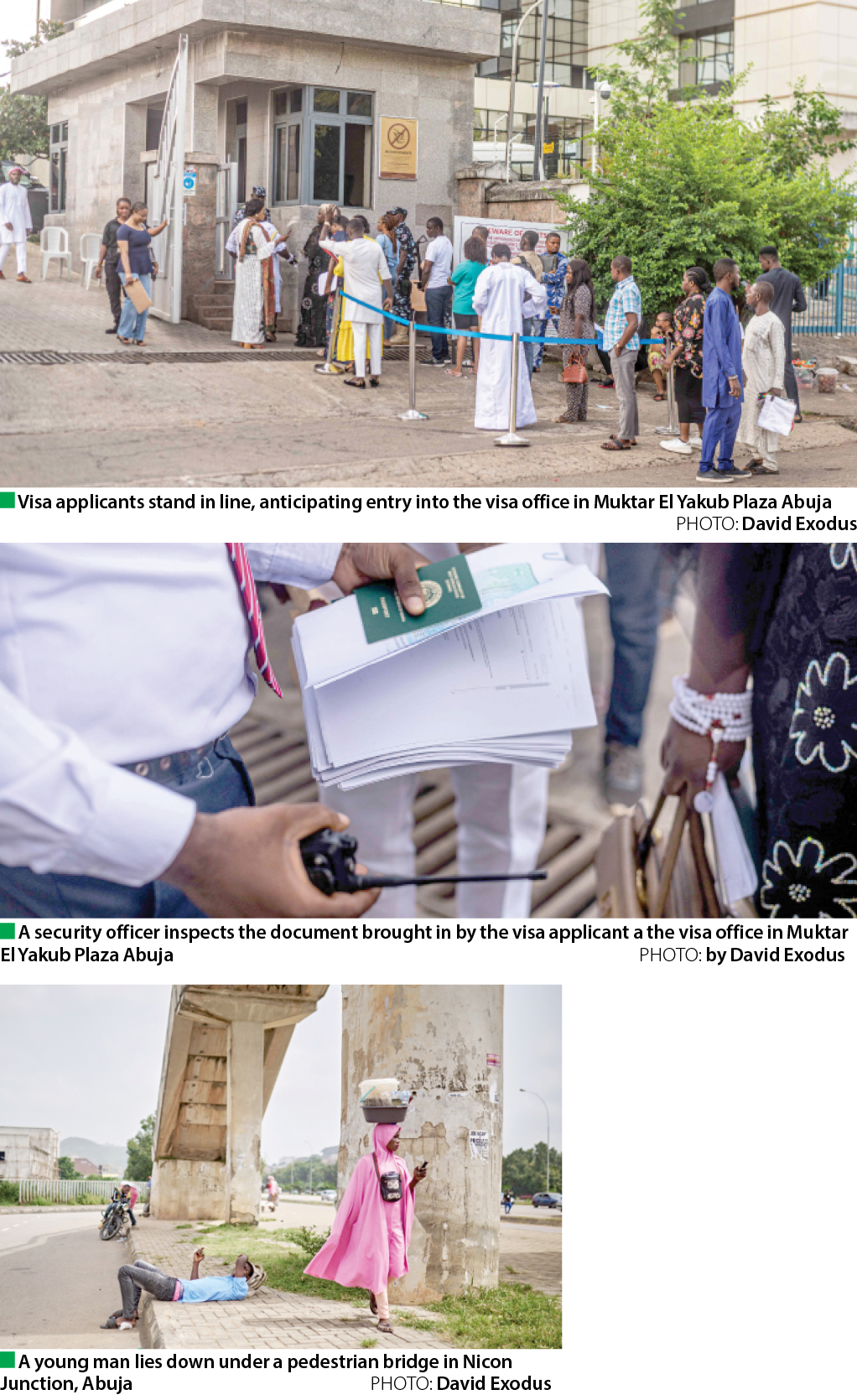Nigeria: The returnees who leave again
Stuck in the desert in Algeria “with nothing”, Uka Ifeanyi, on February 14, 2023, accepted an offer by the International Organisation on Migration (IOM) to “resettle” back home in Nigeria. Brought back by air to Lagos, the IOM staff “asked us to wait for three months for our accommodation and resettlement,” he says when reached […]

Migration Lead Banner
Stuck in the desert in Algeria “with nothing”, Uka Ifeanyi, on February 14, 2023, accepted an offer by the International Organisation on Migration (IOM) to “resettle” back home in Nigeria. Brought back by air to Lagos, the IOM staff “asked us to wait for three months for our accommodation and resettlement,” he says when reached by phone. “However, no one has called us since then.”
This was not what Ifeanyi had expected, since the IOM officials had specifically asked him about his skills and written down his answers, saying that he would be assisted to start a small business in his home area. “They had asked me what I wanted to engage in, and I told them I wanted to go into plumbing business. I’m a good plumber; I can repair toilets; I can trade in cement. They wrote all these things down, gave us each N50,000 (US$65) in a bank card and asked us to go to our homes. But they never called again.”
Grace Onuru squats at night in a primary school
Fellow returnee Grace Onuru, who was living in “bad conditions” in Libya after her efforts to enter into Europe failed, was assisted by the IOM to return to Nigeria in March 2023. Upon their arrival in Lagos, she says, “the IOM officials asked each of us what trade we wanted to engage in. I told them I was a trained nurse, so I wanted to open a pharmaceutical shop.” Like Ifeanyi, Onuru was also given a bank card with the equivalent of US$65 in it. “This was to pay for transport to our homes in Nigeria. They promised to reach out to us in three months. But six months after, nobody has called or reached out to me.” Onuru says she desperately needs help. “At the moment, I’m stranded. None of my family members can help me.” Save for a primary school in Lugbe, Abuja, where she “squats” at night, she has “no place to rest (her) head,” she says. “I have no food to eat and no house to live in. I have no job and no one to turn to.”
I Pray Allah Not To Give Me What Would Not Benefit Others – Alhaji Aminu Dantata
Where is the federal government?
The stories of desperation and abandonment are echoed in several reports, including one commissioned by the European Union itself, that talk of the majority of returned migrants in Nigeria still living in tents, having disappeared, or “worse off than before.”

Most of the returned migrants, like Ifeanyi and Onuru, were stranded in North Africa or the Sahel before they were picked up, either from detention centres or other desperate situations, by the IOM, which receives funding from the European Union to facilitate their transport back home. An estimated one to two million sub-Saharan migrants remain in these northern regions, where many still hope to reach Europe but have reached dead ends.
The percentage of those who are “stuck”, usually in detention, abusive labour conditions, or exploited in brothels or criminal syndicates, is likely to have grown significantly in the past eight years, since European initiatives turned the north African border areas into heavily guarded barriers. Since 2015, EU pressure has led to the criminalisation of transport along migrant routes and the US$6 billion European Emergency Trust Fund for Africa, also established in 2015, has paid for infrastructure that delivers illegal migrants to prisons in Libya (see https://www.groene.nl/artikel/een-hel-creeren-om-mensen-af-te-schrikken (in Dutch) and https://www.msf.org/italy-libya-agreement-five-years-eu-sponsored-abuse-libya-and-central-mediterranean). Total estimates of sub-Saharan Africans currently living in exploitative conditions or detained in countries like Libya hover between one and two million.
The Nigerian government has tasked its National Emergency Management Agency (NEMA) to assist the IOM with the EU-funded returnee and resettlement projects, but according to all sources, the partnership does not yield much result. Both the European Commission report mentioned above and the IOM itself admit that over 60 per cent of Nigerians who were “rescued” are “likely to try leaving again.” Grace Osakue of the NGO Girls Power Initiative, which aims to create small business futures for former and would-be migrants in Nigeria, said in an interview that “even many of those who already experienced the hardship, go again.”
“Even those who experienced the hardship will try again”
Even three established returnees, who have over the past seven years, with help from EU-funded projects, managed to start a fish farm, a hair salon, and a welder’s and electrician’s shop, told me that many to most of the people they came with (one mentioning many “single mothers who were supposed to start hair salons) have left again, in some cases selling their “starter packs”, according to one interviewee, “with help from IOM staff.”
The IOM in Nigeria did not respond to telephonic and emailed requests for comment, either on this accusation, or on any other questions (1).
Inefficiencies
Inefficiencies have certainly befallen the IOM’s Nigerian staff, despite earlier reports by the organisation which boasted of a number of successful returns. Osita Osemene of the Patriotic Citizens Initiative, an NGO involved in the resettlement programme, said that the IOM and the Nigerian government have put in little effort. In his view, the Nigerian government was most to blame for this. “These are Nigerians; our government must take responsibility. The IOM (…) is supposed to continue to support them (…) and give some capital to start business. This has not happened. However, what is the Nigerian government doing about it?”
“But what is the Nigerian government doing about it?”
NEMA spokesman Manzo Ezekiel said in response to questions that his organisation’s mandate is “to receive those who have been evacuated from North Africa by the IOM to Nigeria. We receive them at their points of entry, and give them the financial support to return
to their homes of residence. It is not our responsibility to provide entrepreneurial training or to give them capital to start businesses. That is the responsibility of the National Commission for Refugees, Migrants, and Internally Displaced Persons.” Refugee Commission spokesperson Khadija Imam did not respond to telephonic requests for comment.
Detention centres
According to an investigation by the Correspondent https://thecorrespondent.com/collection/migration, the European Union has funded 47 regional “transport facilitation” projects between 2011 and 2019, whereby migrants found along routes in northern African countries were “assisted to voluntarily return” to their places of origin – at a cost of €775 million. In the case of Nigeria alone, the cost was €68 million https://thecorrespondent.com/150/a-breakdown-of-europes-eur1-5bn-migration-spending-in-nigeria) for that period, with the investment yielding, according to the IOM, a “voluntary return” of 3,042 migrants to Nigeria in 2021.
The number of Nigerians leaving in the opposite direction annually, judging by the yearly average of Nigerian asylum applications in Europe, and extrapolating the probable number that “remains stuck”, could be as much as 85,000 (2).
According to the above mentioned investigation by the Correspondent, the largest expenditure by the European anti-migration Emergency Trust Fund for Africa goes to border control: €250 million out of the €770 million Euro spent between 2011 and 2019 paid for the development of a biometric digital ID for Nigerians meant to stop illegal border crossings. Nevertheless, Nigeria’s borders remain as porous as ever in 2023, while the new biometric ID project has been nothing more than a cash cow for various corrupt syndicates operating in and around Nigeria’s immigration service, NIS https://www.zammagazine.com/investigations/1414-nigeria-the-border-control-syndicate-how-plunder-continues-in-spite-of-parliament-and-the-courts.
A poll conducted by the Nigerian Bureau of Statistics among returnees from Europe shows that migration to Europe would reduce if Nigeria would offer jobs, education, safety and security, social infrastructure, and a change of the prevailing patronage system (“discrimination of certain groups”) that is endemic in the country. But health advocate and former government advisor Dr Ejike Oji, who has studied the migration of medical doctors to Europe, stated in an interview that in order to achieve a real brake on the exodus, the West would “need to change the focus of its interventions away from only border control, and instead engage government officials on the issue of social injustice in Nigeria.”
Box
Japa
The extremely heavy traffic during weekdays on Zakariya Maimalari Street and Muhammadu Buhari Way in the central business district of Abuja, Nigeria, is almost entirely caused by the stream of young men and women who park their cars on walkways to enter the visa application centres situated here. The parking lot for visitors to the VFS Global visa company, located on multiple floors in the Sterling Bank edifice on Muhammadu Buhari, has long ceased to be sufficient to accommodate the overflow of applicants. The same goes for the parking at VFS’s competitor TLSContact, which occupies the third floor of the gigantic Mukhtar El-Yakub Plaza on Zakariya Malari.
The hundreds of would-be travellers here are qualified health personnel, IT experts, accountants, and other professionals. They want to “japa”, as the phenomenon is called in Nigeria: a Yoruba word that roughly translates as “escape” or “run away”. Motives to japa, expressed by the people queuing here, vary from the high unemployment rate (about 41 percent of the working age bracket) and the extreme poverty (affecting 133 million out of a 200 million population), to corruption and misgovernance by the extremely wealthy elite. Dr Ejike Oji argues that it is specifically “the frustration of excellence”, in a system based on patronage instead of competence, that chases professionals away. “Appointments (here) are not based on merit. Persons who are qualified are bypassed in favour of the children of the rich, politicians and elite,” he said.
Asked why they were going, a building contractor said, “The suffering (in Nigeria) was unbearable.” A plumber sighed that he just feels sad. “I would have loved to stay in Nigeria, if the country worked,” he stated. Early in 2023, Nigeria’s National Assembly attempted to pass a law that would prevent medical personnel from leaving Nigeria for work abroad until they had served the country for a minimum of five years. The bill was shot down as “discriminatory”. In early June, another bill to put in place measures that would halt japa was introduced in the legislature, but it did not see the light of day either. Nigeria’s daily issuance of passports, priced at the equivalent of US$30, was 5,000 per day, but the government recently announced that it will ramp it up to 24,000 per day https://punchng.com/nis-to-commence-24000-passports-daily-production-soon-fg/ in the face of much-increased demand. Many of the visa applicants are hoping for possibilities for medical and technical work in Europe, but one interviewee who was still doubting whether to leave remarked: “Europe wants us to develop, but how do we do that when all our brains are leaving?”
END BOX
Note 1: Involvement of “Nigerian government staff” and “security officials” in “migrant trafficking” was noted in a 2023 report by the US State Department office in Nigerian refugee camps https://www.state.gov/reports/2023-trafficking-in-persons-report/nigeria.
Note 2: The very rough number is derived from 2007 estimates indicating that between 20 and 38 per cent of illegal migrants travelling the northern route, aiming for Europe, never succeed in proceeding beyond North Africa, see “Irregular migration from West Africa to the Maghreb and the European Union: An Overview of Recent Trends” by Hein de Haas https://publications.iom.int/system/files/pdf/mrs-32_en.pdf. We applied these (admittedly old) percentages to a base number of the 16,980 European asylum applications by Nigerians in 2022, https://euaa.europa.eu/latest-asylum-trends-annual-overview-2021#:~:text=EU%2B%20asylum%20authorities%20issued%20about,first%20instance%20granted%20refugee%20status. According to this calculation, 84,900 would have tried to get to Europe, around 68,000 (80 per cent) would have gotten stuck in North Africa, and only 16,980 would have “made it.”
